“A Spider in the Web”
Written by Lawrence G. DiTillio
Directed by Kevin G. Cremin
Season 2, Episode 6
Production episode 206
Original air date: December 7, 1994
It was the dawn of the third age… The CEO of FutureCorp, Taro Isogi, is having a meeting on B5 with Amanda Carter, a representative of the Mars Provisional Government, to discuss FutureCorp expanding to Mars. This would help Mars be more independent in a way that wouldn’t involve bloodshed. Winters—who is an old friend of Isogi’s—is hired to monitor the meetings telepathically.
This meeting concerns the senate, apparently: Senator Elise Voudreau all but orders Sheridan to spy on the meeting, as the senate is convinced that FutureCorp is planning to finance a Mars armed rebellion. Sheridan sticks to his metaphorical guns on the subject: he doesn’t have any jurisdiction over civilian negotiations, and the whole point of B5 is that it’s neutral territory. Voudreau insists he at least keep an eye on things.
Under the nuclear wasteland that used to be San Diego, a mysterious unseen person starts an operation on B5, which leads to a cargo container opening and a hand appearing from inside it. The hand belongs to a person who seeks out Isogi and kills him in front of Winters, saying, “Free Mars!” before using a cybernetic hand to send a crapton of electricity through Isogi.
When interviewed by Sheridan and Garibaldi afterward, Winters says that she sensed no emotion from the killer, indeed only saw a single image of a ship being fired on in space in his mind. The assassin hacks a communications station and speaks with the mysterious Control, who orders him to eliminate Winters, as she’s a witness.
Sheridan informs a stunned Carter of Isogi’s death; she promises to do whatever she can to aid in the investigation, as she respected Isogi and states that he was Mars’ best hope for a peaceful future.
Garibaldi doesn’t see how Free Mars could get their hands on so sophisticated and expensive a piece of tech as the murder weapon—what’s more, he’s not sure how that weapon got smuggled onto the station.
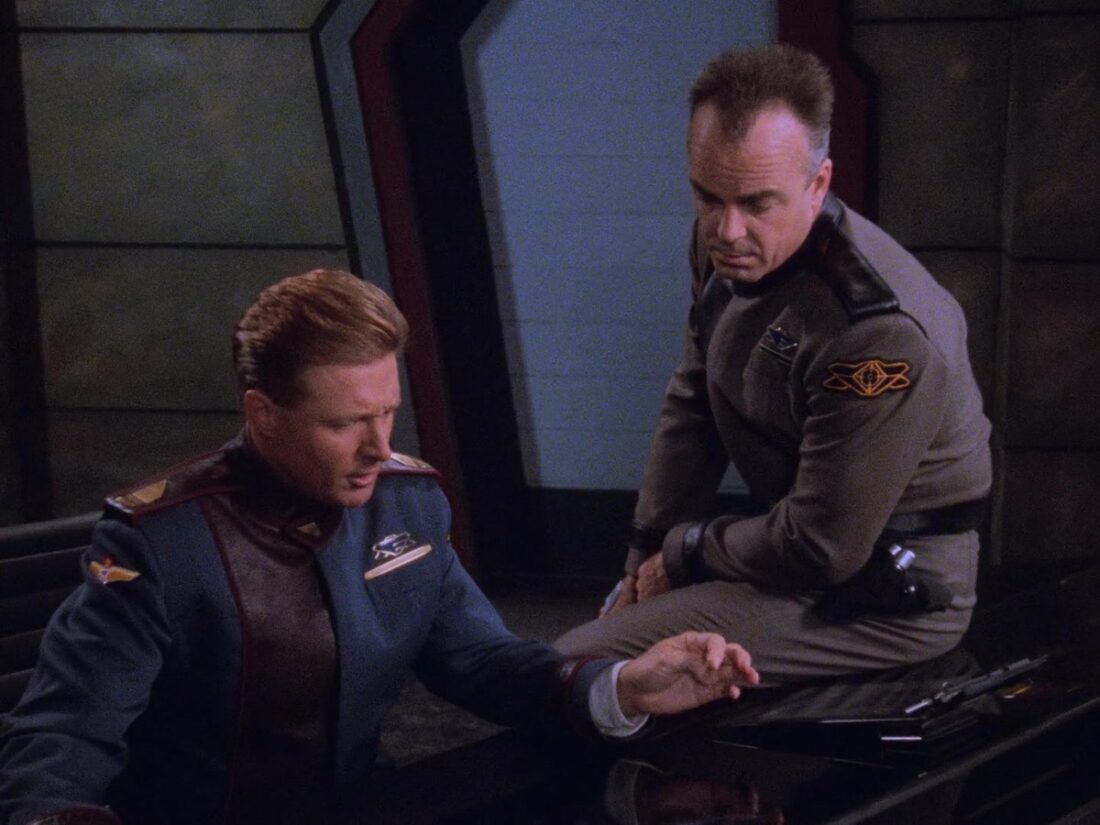
The assassin kills Winters’ security escort, but before he can kill her, Winters again probes his mind, and it becomes clear that it’s the assassin himself in a small space ship being blown up. The assassin is, to say the least, confused, and stumbles off. Winters later tells Sheridan that she distinctly saw the moment of his death—neat trick, given that he’s obviously alive. However, the assassin left some DNA behind, and Garibaldi identifies him as Abel Horn—deceased. He was indeed a leader of Free Mars, but he was supposedly killed when his ship was fired upon by the EAS Pournelle.
For his part, a now-very-confused Horn goes to Carter’s rented quarters. They’re old friends—Carter, it turns out, has a past with Free Mars that she would prefer to keep buried—and Horn starts having seizures and begging Carter to bring Winters here, as she would have the answers he needs.
After settling Winters in her quarters, Garibaldi meets with Sheridan, who reveals a secret project—one of several that Sheridan has taken an interest in over the years—called Project: Lazarus. It was from twenty years earlier, an attempt to take the recently deceased and “resurrect” them with cybernetic implants to turn them into, in essence, zombie soldiers. He thinks this might be what happened to Horn after the Pournelle fired on him.
Horn falls asleep, and Carter contacts Winters, who agrees to meet with her. (Carter doesn’t mention Horn at all.) Even as Garibaldi gives permission for Winters to meet with Carter, Sheridan starts a specialized scan to try to find Horn.
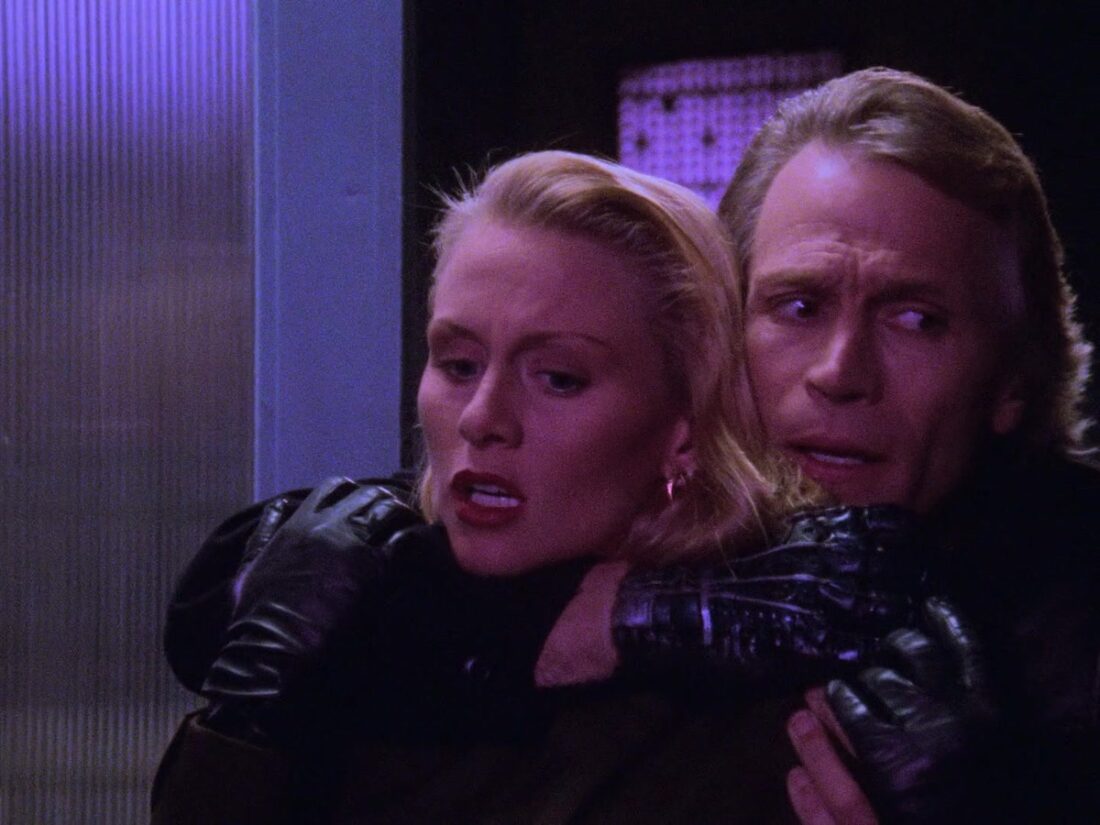
Winters is escorted by Zack Allan and some other security guards, but they stay in the corridor while she goes in. (Why her escort doesn’t secure the room she’s entering is left as an exercise for the viewer.) As soon as the door closes, Horn jumps her, having already rendered Carter unconscious. At his rather insistent and violent request, Winters scans Horn, and not only sees his being “killed” by the Pournelle, but also his being operated on by two surgeons, supervised by a Psi Cop.
Sheridan tracks Horn to Carter’s quarters. Allan and the rest of the detail go in, soon followed by Sheridan and Garibaldi. However, Horn has Winters as a hostage, and they all have to put their PPGs down. Horn picks up one weapon and fires badly, forcing Sheridan to fire his PPG. His cybernetic implants then explode, which they all run away fast from, barely escaping damage. Of Horn’s corpse, there’s no sign.
While Carter is being treated in medlab, she admits to being former Free Mars, back when they were just a political organization. Once they modulated into being terrorists, she quit. Sheridan agrees to keep Carter’s past out of the public record, on the condition that she continue negotiating with FutureCorp.
Winters doesn’t tell Sheridan or Garibaldi about the Psi Cop she saw in Horn’s mind, just that he was operated on. When she checks the records, she sees that that particular Psi Cop is listed as deceased. But when we cut back to San Diego, we see that the person running this op is that very same Psi Cop.
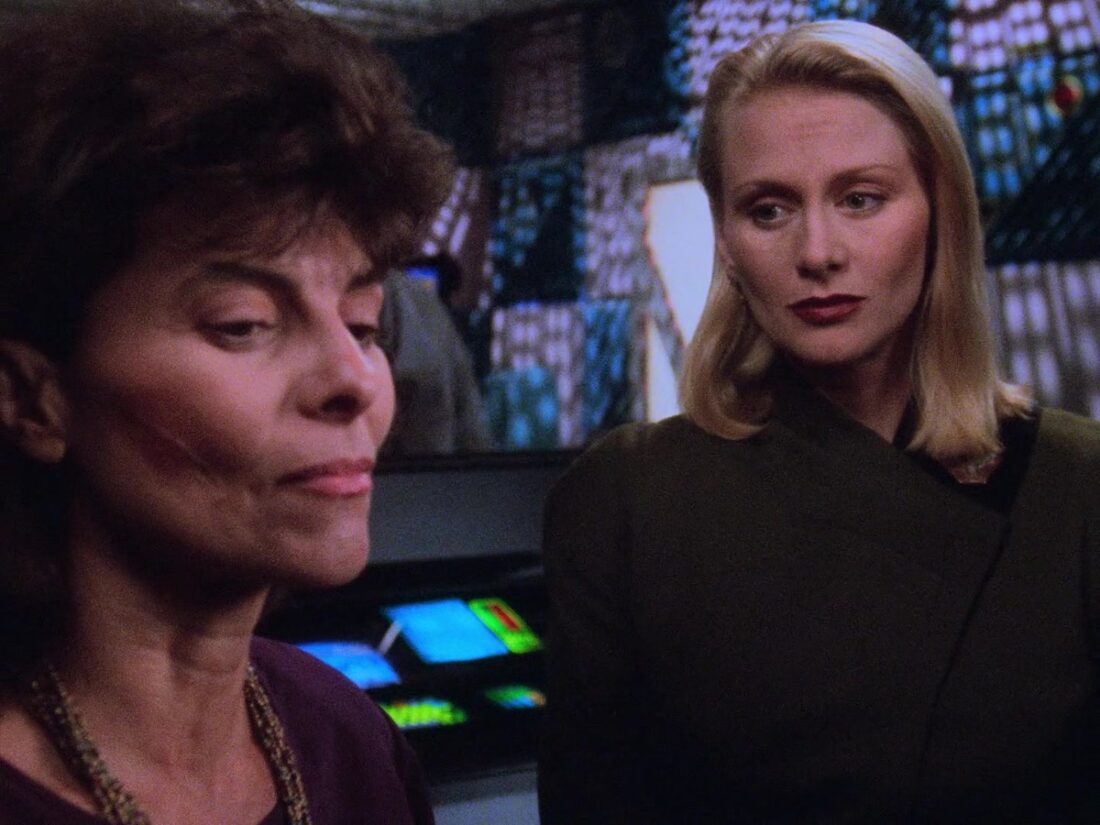
Get the hell out of our galaxy! Sheridan tells Ivanova the story of his first contact with the Tikar, when he was captain of the Agamemnon.
Ivanova is God. Ivanova surprises Sheridan by saying that Winters is trustworthy, but also cautions that she is fiercely loyal to the Psi Corps. The rest of the episode bears this out, as Winters is helpful in the general investigation, but hides Psi Corps’ involvement.
The household god of frustration. One of Garibaldi’s people is killed. At no point does Garibaldi comment on this or even seem to be concerned about the loss of one of his people. But hey, he didn’t have a speaking part, so obviously not that important…
The Corps is mother, the Corps is father. Psi Corps figured out how to make Project: Lazaurs work. Previous iterations had the original personality dominating the cybernetic implants, but Psi Corps was able to have the subjects’ minds focus entirely upon the moment of their death, thus allowing the implants free rein to do their thing.
No sex, please, we’re EarthForce. Garibaldi acts like his usual aggressive creepy self toward Winters, who very politely tells him to fuck off and die, after which he’s a lot nicer to her. Gawrsh. (Making this all even more meta is that Jerry Doyle and Andrea Thompson were married from 1995 to 1997.)
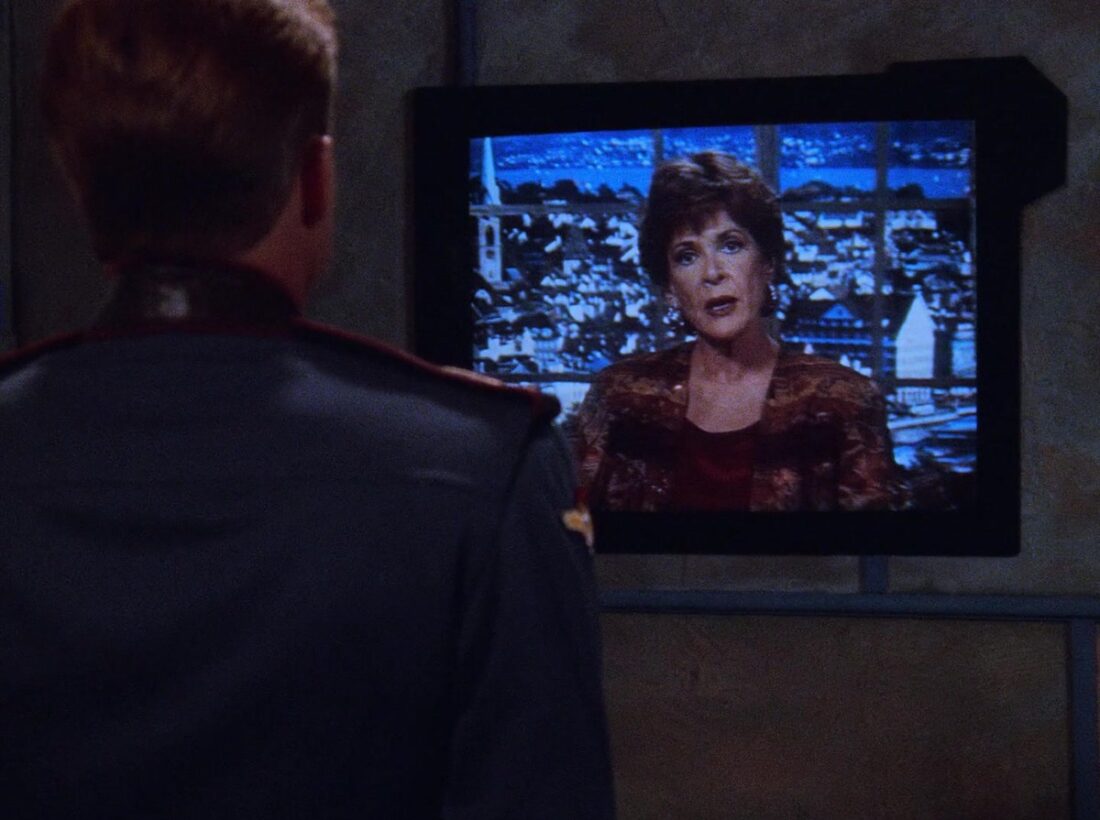
Welcome aboard. Michael Beck gets billing as a special guest star for some reason as Horn. He’ll be back on Crusade’s “The Well of Forever” as Mr. Jones. Much cooler are the appearances by two greats: Adrienne Barbeau as Carter and Jessica Walter as Voudreau.
Eternal character actor James Shigeta plays Isogi and Annie Grindlay plays the mysterious Psi Cop.
In addition, this is the debut of Jeff Conaway as Allan; Conaway will appear in seven more second-season episodes (the next being “The Coming of Shadows”) before being elevated to opening-credits regular in season three. Joshua Cox also appears in his recurring role of Corwin, back from “A Distant Star.”
Trivial matters. This is the only appearance of Bureau 13. After the episode was aired, the producers learned of the role-playing game of the same name. Rather than cause confusion in the marketplace, the organization was dropped, though the mysterious “Control” that is working on behalf of the Bureau on B5 will be seen again, in a way that is contradictory to this episode, as we’ll see when we get that far in “Divided Loyalties.”
J. Michael Straczynski lived in San Diego for many years and has a lot of affection for the city, which is apparently why he decided that in his future history, it was nuked. (Given that San Diego hosts a large naval base, that it would be a target of military action is pretty plausible.)
Isogi mentions that Carter’s great-grandfather John piloted the first colony ship to Mars. This is a tribute to Edgar Rice Burroughs’ John Carter, the protagonist of A Princess of Mars and its various sequels.
The Pournelle is likely named after veteran science fiction author Jerry Pournelle.
Scripter Lawrence G. DiTillio has said that he assumes that Knight One and Knight Two from “And the Sky Full of Stars” also worked for Bureau 13.
The storyline in the fifth through eighth issues of DC’s Babylon 5 comic book by Tim DeHaas & John Ridgway, entitled “Shadows Past and Present,” take place in the general vicinity of this storyline.
The echoes of all of our conversations.
“Mr. Garibaldi, Taro Isogi was like a father to me. I loved him as a client and as a mentor and as a friend, and now he’s dead. You’ll forgive me if I’m not in the mood for your usual badinage.”
“You’re right—it’s a bad time for you, I’m being a yutz.”
“Apology accepted.”
“Could you at least tell me what ‘badinage’ means?”
—Winters smacking Garibaldi down, Garibaldi apologizing and then breaking the tension.
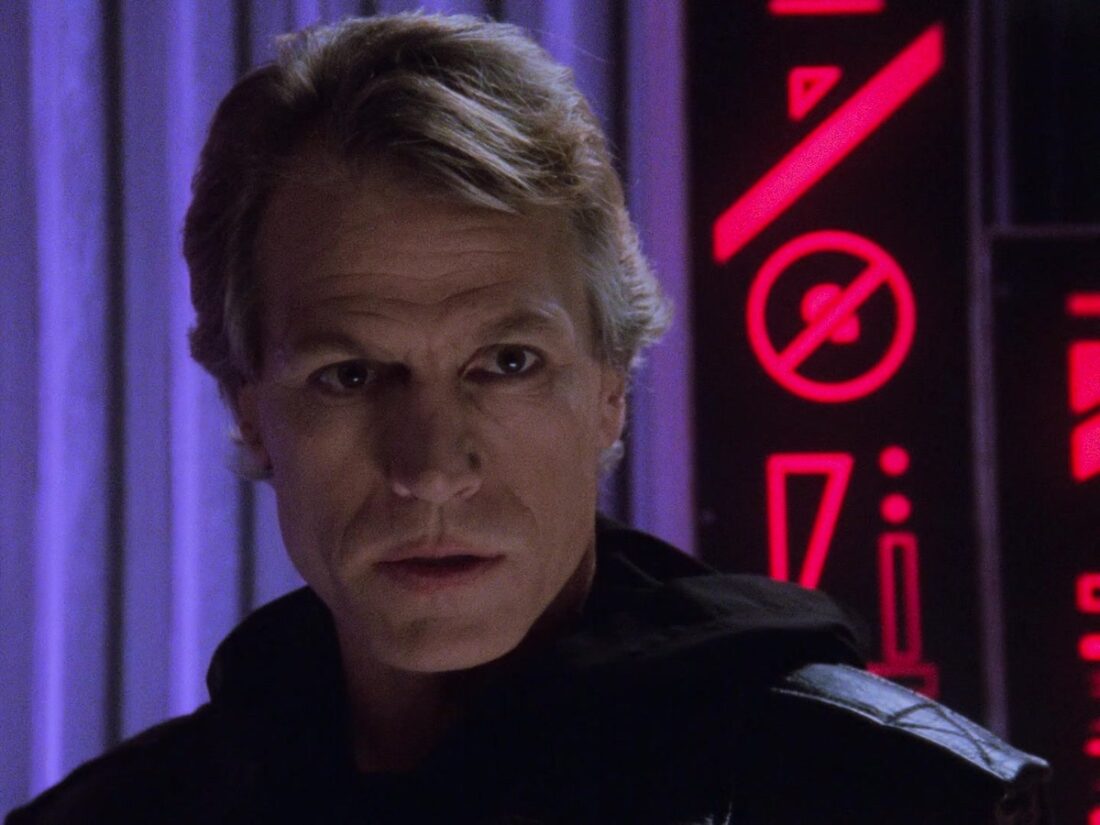
The name of the place is Babylon 5. “These are volatile times.” This is a perfectly decent little episode, one that promises lots of nifty possibilities in the future, not all of which are entirely picked up on. For one thing, this is the only time we’ll see Carter or Voudreau, which is majorly disappointing, as both Adrienne Barbeau and Jessica Walter are fabulous. In particular, it feels like the late great Walter is wasted in a role that consists entirely of one conversation over a viewscreen. If you’re gonna hire Lucille Bluth, you should give her a way meatier part than that! Ah, well…
In addition, Sheridan’s habit of digging up weird-ass black-ops projects seems like just a very weird hobby, but we’ll also see that pay off before too long as well.
Once again, we have Winters as part of a story where things happen to other people and she has to react to it. Winters herself remains a complete cipher. Andrea Thompson is doing the best she can, but the character is pretty much just an empty container into which the plot is poured every time she appears, which may be why the actor decided not to continue in the role. (More on that later this season.)
The biggest flaw in the episode is, alas, the guest casting of Horn, as Michael Beck is a throwback to the first season’s array of bland-ass guest stars. Still, it’s, as I said, a perfectly decent episode, one that reminds us how dire things are back on Earth, while continuing the background element of Mars’ independence, one the show will continue to return to.
Next week: “Soul Mates.”










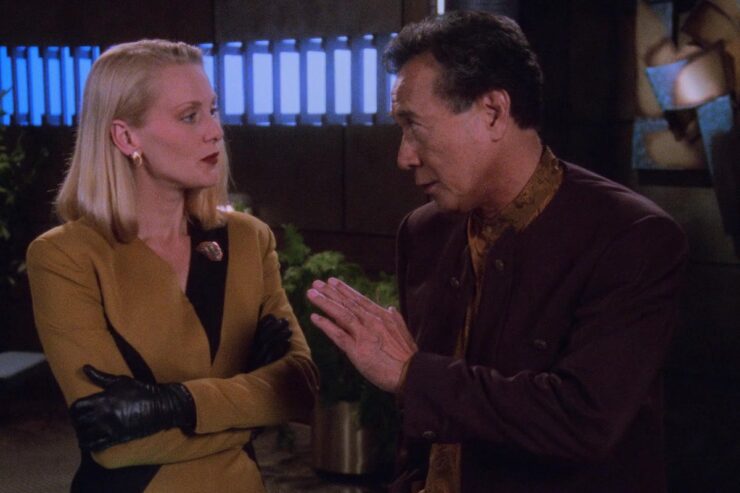
I swear that the redshirt assigned to Talia who was subjected to a rail killing was also among the redshirts with Garibaldi in the climax. I guess he got better.
Another ship mentioned that shares a name with a science fiction author is the [Richard] Matheson.
Another accidental sorta RPG mention occurs when Garibaldi says his father died from Torg’s syndrome. At the time, Torg was the name of a multi-genre RPG published by West End Games. The title was actually an acronym for The Other Role-playing Game meant to serve as a placeholder until they came up with a better title. Which they kind of didn’t (whoops!). It is even more probably a coincidence, as (at least according to Google Translate) it’s also a Swedish word for a town square. Which in a roundabout way connects it to breen.
And of course this episode introduces Zack Allan as portrayed by Jeff Conaway, renowned star of many fine USA Network softcore skin flicks like Dark Underpants, The Crotchless Killers, and The Waco Panty Raid. Also Taxi and Wizards and Warriors.
Riffable moments
Talia: You were dying. They operated on you, rebuilt you.
Better, stronger, faster
Sheridan: Some people collect coins or art. I collect secrets. Black projects, conspiracies, secret organizations. They fascinate me.
Garibaldi: Does one of those secrets include who was behind this thing?
No, but I know who was on the grassy knoll.
I swear that the redshirt assigned to Talia who was subjected to a rail killing was also among the redshirts with Garibaldi in the climax. I guess he got better.
I thought the exact same thing.
Re: Torg. My first thought was that it referenced Torgo from Manos: The Hands of Fate. Obviously called that because of the way it affected sufferers’ mobility. With DiTillio writing, either one is possible.
I agree that’s it’s a decent episode, but not much more.
One thing that does, sort of, pay off down the line is relationship between Ivanova and Talia. It’s possible to read her slightly muddled response to Sheridan about Talia as struggling with finding herself liking someone associated with PsiCorps, but it could also be read as her struggling with other feelings as well.
Jessica Walter does a fine job, but I also felt her interpretation of her character was missing something. The bite of Lucille Bluth or Malory Archer just isn’t quite there.
It’s often joked that B5 is a show about people having important conversations in elevators. We’re 28 episodes in, and this might be the closest we’ve come that. Of course, it’s Garibaldi and Winters for the third or fourth time, but they do have an actual conversation about something this time.
Surprised to Zack this early. Like with Refa, I thought of him more as a S3 character.
I was much more interested in learning more details about the situation on Mars, which was only described in the vaguest of terms, than the whole zombie soldier conspiracy story, so I was left feeling a little bit frustrated by this episode, but it was perfectly serviceable, and it’s always fun to see Adrienne Barbeau.
I noticed here that B5 doesn’t like using doors. The door to Carter’s room is left open for the explosion (possibly to have a place to vent, but also endangering anyone in the corridor). In the final scene when Sheridan explains about Bureau 13, Garibaldi has walked into the room but no door is shut. So much for private conversation.
I figured it just blew the door out of its frame. Interior doors probably aren’t blast-proof, not against a blast that big, at least.
But yeah, it’s been remarked before in this rewatch that the lack of a door on the commander’s private office is weird.
Destroying a door in one of the regular sets would presumably have added construction costs. I don’t know whether that scene uses one of the general-purpose sets, or whether it was built for the explosion shot, but either way cost might have been a factor.
The explosion was seen from a side corridor (with Sheridan jumping away/getting knocked down by the blast). My point was that no one closed the door as they left the room. It was clearly open still as they all ran for safety.
Don’t they usually close automatically? With multiple people exiting, the door mechanism could have delayed closing a bit until it was sure nobody else was coming through, then closed the door after the shot cut away — then been blown out by the explosion despite its best efforts to be a diligent and responsible door. “Glad to be of service…”
I like to think that the open pathway to the commander’s private office might be a Minbari thing. These are the same people who think having open gun ports is a good way to introduce themselves. They would totally have no doors on private offices probably to show that they are “open and free of mind” or something
To keep viewer attention across episodes and to immunize our noble core characters from taint, having a murky covert government group can be a handy piece of plot machinery. It lets you crank the gears of the plot and reveal tidbits piecemeal. I seem to recall CLB(?) pointing something like that out in a comment somewhere on this site.
This episode touches on a number of things which will become important later on.
But lordy, the conspiracy plot device with its permutations seems so ubiquitous and timeworn that it mostly just makes me tired when it pops up. Or maybe I’ve just seen it one time too often recently and something tripped in my brain.
OTOH, Adrienne Barbeau! Jeff Conaway!
Anybody else having trouble submitting comments with paragraph breaks? When I try, it won’t submit. Sorry, use your imagination on where the breaks should go.
“(Why her escort doesn’t secure the room she’s entering is left as an exercise for the viewer.) ”
This ties into the most consistent long-term arc in the show, Garabaldi is terrible at his job. Also: JMS did not know what to do with Talia, every time she shows up she’s a part of somebody else’s plan and usually ends up suffering (Deathwalker/Quality of Mercy/Mind War).
I liked this one less. This plan doesn’t really appear to make sense from the bureau’s perspective– governments rarely have trouble recruiting people willing to kill for them, so sending a Manchurian candidate to just be a common hitter is overly complicated, just hire a regular hitter. And if they can smuggle him in with a weapon, why give him a crappy melee attack, just give him a gun so he can shoot people like a normal person. The more valuable way to use him would be as propaganda to denounce his former beliefs or otherwise discredit the movement. At first it looks like the intent is to discredit the movement by having this guy be publicly identified as the killer, but Talia as a witness was just an accident, she disrupted the plan because of her telepathic abilities. Which makes the “FREE MARS” red herring seemingly pointless, nobody was supposed to survive that encounter.
the whole propaganda motive and Talia accidently living and becoming a target also makes less sense when they reveal who Control actually is.
I found this one fairly good, though a lot of what it set up would never be followed up on once DiTillio left the series. I was impressed by how much better Andrea Thompson’s performance was here than in the first season.
I think my favorite scene was the one that had the least to do with plot and was just pure character — Sheridan telling Ivanova about that first contact and how wondrous it was. I wonder how a spaceship can look like a green cloud, though.
Once again, B5 gives a Japanese character a made-up name. Taro is a pretty generic Japanese male given name, but as far as I can tell, Isogi isn’t a real surname; it’s a form of isogu, meaning to hurry, and can mean hasty or urgent. And as is often the case, American writers don’t understand Japanese honorifics. It’s odd for Talia to call him “Isogi-san” when he first enters and then “Taro” the rest of the time. As a rule, you’re supposed to use the appropriate honorific every time you address someone, so she’d consistently call him “Isogi-san,” “Taro-san,” or “Taro,” depending on their relationship. I suppose maybe she was more formal when he first arrived because she was being professional, but in that case, as a company CEO, the proper address would be “Isogi-shachou.” On the other hand, Isogi’s near-nonexistent Japanese accent and his lack of bowing suggest he may not live or work in Japan, in which case he might not use honorifics at all.
Keith, you’re probably wise to say the second comics arc only takes place in this vicinity. The B5 wiki claims it’s before this episode, but the comic itself just says it’s sometime before “The Coming of Shadows,” which is still 3 weeks away. Like the first arc, it’s plotted by JMS. It has a frame story where Garibaldi gets too close to finding out about the Shadows’ connection to Londo and Morden pressures Londo to sell Garibaldi out, with a flashback narrated by Garibaldi to Keffer, telling how Garibaldi and Sinclair first met on a secret mission where they saw Shadow ships on Mars doing something with telepaths, one of whom (revealed to the reader but not the characters) was Talia. The artwork is significantly better this time, but the rendering of the Shadow ships isn’t quite right, and they’re colored as solid gray without the mottling they have in the show (though the cover art comes closer).
“I was impressed by how much better Andrea Thompson’s performance was here than in the first season.”
I feel that way about all the regular and recurring cast except for Christian, Katsulas, Furlan and Jurasik, who were already very good in their roles. I think it’s one of the reasons I’m enjoying this season more than the last one for the most part.
So Keffer remains a totally unimportant character who is just a sounding board. Poor guy.
Apropos of nothing, ‘Agamemnon’ is one of my favourite names for a warship – for which I’m tempted to blame fond memories of Mr. Brian Cox chewing the scenery in TROY, through “Ah-GAH-memmm-non” is quite fun to say, whether that’s the technically-correct pronunciation or not.
That the name comes with a whole freight load of Classical Tragedy and Imperious Legend doesn’t hurt either.
I just want to say that I don’t really like plot lines in science fiction that are about Mars being colonized by Earth humans and the colonists eventually demanding independence, because I think by now they are soooooooooooo cliched and overdone.
Also: I think it was a mistake to place this much emphasis on Mars without actually having a Martian in the cast. Stories tend to work better when the stakes are at least somewhat personal, but the show at this point can’t afford to shoot any scenes set on Mars and didn’t bother making anybody’s backstory that they grew up on Mars. Okay, so a bunch of unseen randos have an abstract political concern. Great.
well, Garibaldi has some connections to Mars. not al ot, but I think it does become more important in season 4
The flashback to Garibaldi’s past in the second comics arc took place on Mars. He spent some of his childhood on Mars according to the B5 wiki, and he was posted to Mars for nine years preceding his transfer to Babylon 5, during which time he met Jeffrey Sinclair and the love of his life. So yeah, he’s got a lot of connections to Mars.
The main thing that bugs me about them is that they almost always treat Mars as a single colonial culture, which seems unrealistic to me. In my original prose-SF universe, I approach it more like the European settlement of the Americas — there are multiple separate Martian states settled by different Earth nations and/or corporations, and some of them have rebelled and gained independence while others remain under colonial rule. (By the same token, I have multiple conflicting subcultures in the Asteroid Belt rather than the monolithic “Belter” cultures you tend to see in a lot of SF.)
I guess it depends which pipe dream you posit will actually happen first. The technology to live sustainably on Mars, or cooperate well enough to unify earth.
This episode is ok, BUT it really falls apart on a second viewing when you have seen the rest of the show and certain things just do not make sense. I know that’ s because of rewrites but…well let’s say Talia makes weird decisions in this episode
The only decision that Talia makes is to not tell Sheridan that a Psi Cop was behind Abel’s “reprogramming”. And maybe to want to continue Isogi’s plans for Mars. I don’t see either of those as weird, considering her history and character.
Well, there is the weird problem of why she was a target though. espeically after some revelations that come down the line
Talia was aware the lady didn’t have any ulterior motives and wanted a peaceful path to Martian independence. With Talia dead they can expose her being with Free Mars and discredit the whole Martian independence movement.
Sometimes with this stuff in real life, the left hand doesn’t know what the right hand is doing because everything is need to know and nobody connects the dots that two operations have an unexpected connection. It’s a somewhat common occurrence for an FBI Agent to arrest an undercover cop or the cops to arrest an undercover FBI Agent because each agency has no idea what the other is doing. I’m prepared to accept that fictional organizations are similarly uncoordinated.
true but..well we can continue this discussion when we reach Divided Loyalties.
I don’t think the assassin hacked a communications station. He didn’t need to: that implies unauthorized access, and this wasn’t unauthorized. He accessed some hidden layer implanted by whatever obscure black Earth agency is involved in this, which clearly has superogatory powers over what the terminals are normally doing. That’s authorized access. It’s a backdoor, but it’s no less authorized for all that.
(The backdoor goes completely undetected and one must assume more or less unused, even though the staff never take any measures to block any such thing in the future, even after the breakaway in season 3. Changing a bunch of passwords will definitely not suffice, but maybe in Hollywood Systems Security that’s not true.)
There’s also the fact that it was never explained how the power source in Horn’s bionic arm went undetected when he was shipped aboard. It was implied that he had some kind of help getting past security.
There is a shot of him exiting some kind of container. I take the implication to be that the container was shielded in some way. But it could be simpler: B5 cargo security seems to be fairly porous at the best of times. It doesn’t seem hard to get the necessary people to look the other way from time to time.
The container would’ve been my first thought, but when Sheridan and Garibaldi were discussing how the power source went undetected, one of them (Sheridan, I think) said “Maybe he had some special help,” declining to elaborate further. And then the question was never answered. If the intent had just been that the container was shielded, presumably they would’ve said as much. The fact that “special help” was hinted at and the question was left dangling tells me that it was intended to be a hint of a larger conspiracy, one that ended up not paying off as plans changed.
the only good cargo scrutiny guy who was actually doing his job correctly did die way back in season 1.
It’s funny how much this show runs on the trope of security guards dying, decades after redshirt jokes were such a well-known genre. Homage or just reflecting the reality that killing a disposable guest star off is a convenient way to raise the stakes? Regardless, between turncoats and casualties, Garabaldi must always be hiring.
“It’s funny how much this show runs on the trope of security guards dying, decades after redshirt jokes were such a well-known genre.”
I think you have that backward. “Redshirt jokes” are more a modern phenomenon in fandom, I think. A Google Ngram search for “redshirt” shows the term only gradually becoming more widespread from the mid-’70s and then becoming far more common after 2000, though of course the word has other uses, so there’s no way to separate out the Trek term specifically.
https://books.google.com/ngrams/graph?content=redshirt&year_start=1966&year_end=2022&corpus=en&smoothing=3&case_insensitive=true
And no, it’s not an homage. Star Trek didn’t invent the trope of extras being casually killed off; that was a staple of countless war movies, Westerns, gangster movies, you name it, going back to the dawn of cinema and no doubt before that in live theater. If nothing else, it gives gainful employment to stunt performers. And it’s natural that bodyguard types would be disproportionately killed off, because their job is to protect people from danger and stories require putting people in danger, hence the guards have to be gotten out of the way first.
Ooh, thanks for that ngram search. Shows how bad memory (or at least my memory) is; things got jumbled up and I thought redshirts as parlance for disposable characters came way earlier than the 2000’s. It’s nice to have a way to actually check when terms got popularized.
It’s possible the joke existed in fandom before then, but it didn’t become as ubiquitous a meme until this century. Still, I just skimmed through the penultimate chapter of David Gerrold’s 1973 The World of Star Trek, which focused on his critiques of the show’s weaknesses and how he felt they could’ve been improved on. And though he did complain about the show’s overuse of danger to the regular characters as a storytelling shortcut, he didn’t mention the frequent deaths of security guards at all — except at one point when he was proposing his alternative format where the show would focus on a “Contact Team” that would go into danger instead of the captain and first officer always doing it, and suggested that it would be a logical job for the ship’s “Security Forces.” (Gerrold incorporated a version of this idea into TNG, with Riker usually leading the away teams while Picard stayed on the ship.)
So that suggests that Gerrold didn’t see the frequent killing of security guards as a flaw in the show, probably because it was such a ubiquitous action trope that it didn’t stand out. Plus, Gerrold strikes me as someone who would have used the term “redshirt” if it had been in the vernacular at the time — heck, I wouldn’t have been surprised if he’d coined the word. But he didn’t use it at all.
There’s also the fact that Bill Thiess decided to swap the red and gold department colors in TNG, possibly because it was felt that Stewart and Frakes looked more commanding in red. That suggests that the idea of red uniforms having a stigma attached to them hadn’t become widespread as of 1987.
Not to mention that it’s always been silly to equate red shirts with “doomed to die,” because TOS used red for engineering and operations as well as security. It’s just one more case of a running joke that took off as a meme to the point that people mistake it for the truth.
A Google Ngram search for “redshirt” shows the term only gradually becoming more widespread from the mid-’70s and then becoming far more common after 2000, though of course the word has other uses
For instance, the Redshirts was an organization led by (wait for it) Giuseppe Garibaldi.
And in college football a redshirt is someone who sits out for a season to extend their eligibility to play.
Which dates to around 1950 according to the Online Etymology Dictionary, so the use of the term in Trek fandom probably derived from its sports usage.
The reference to the Pournelle is a deep cut. Pournelle (JEP herafter) and JMS had a public feud when JEP was president of the SFWA. and for reasons attributable only to the intervention of Murphy, when JMS was trying to get Babylon 5 made in the early 1990s, he and JEP would be invited as guests at the same LA and San Diego conventions, where JEP would publicly say that he wished JMS well…and would, in private, rail at Hollywood scriptwriters getting paid several dollars per word for writing short stories with funny formatting.
(Bringing up the fact that the Hollywood script writers have the WGA negotiating on their behalf would cause JEP to fulminate for a good 30 minutes. JEP had tried to turn some of his early novels into scripts, and got stone walled by the WGA — for good reasons, because JEP was submitting scripts in ways the WGA explicitly forbids as practices — and so JEP would never acknowledge the connection between the union and the better pay rate, because that would mean acknowledging the union was right about how he was behaving in the late ’70s.)
So having the Pournelle firing on an enemy ship is a bit of deep cut.
I always enjoyed this one. A lot of season 2 (and this episode in particular) is very effective in building a sense of dread, of the unknown, of what lies beyond the shadows. When I first watched this one, not knowing what would happen in the following seasons, “Spider in the Web” capitalizes on this feeling of mystery and paranoia, that everything these characters have worked for may be torn apart by unseen forces, whether it’s because of President Clark, the Psi Corps or in this case, Bureau 13 and whoever else they’re connected to. I think this episode is more effective than a lot of the X-Files mythology episodes that were all the rage in pop culture during this particular period.
While I’m sorry that the show never revisited Bureau 13, I’m also glad Straczynski took the noble decision to not piggyback on someone else’s hard work and trademark. A lesser writer might not have cared and kept using the name regardless.
And it was probably not intentional, but for whatever reason we got not one, not two, but three Talia Winters episodes in a row, starting with this one. That’s more focus than the entirety of season 1. If anything, I was surprised that Thompson decided to call it quits by season’s end. But I agree her only role in this particular episode is more of a plot device due to her telepathy and ability to read Horn’s repressed memories and to play victim to Horn’s violence.
I often wonder what the show would have been like had DiTillio remained on staff as JMS’s number 2. I don’t know if the way the overall plot unfolds in seasons 3 and 4 would have changed significantly. They had already done the big change replacing Sinclair with Sheridan. But sometimes I feel some of the one-off episodes in those seasons (the ones less connected to the bigger arc) could have benefitted from an extra pair of hands instead of JMS writing every single scene across 44 episodes.
Even through Thompson was main credits she’s only in few eposides. JMS couldn’t give her a guarantee as to when she would work. Thompson also had to turn down jobs because she didn’t know when she would be working on B5. JMS told her Talia’s arc was going somewhere down the line. So Thompson decided to quit the show and find other work.